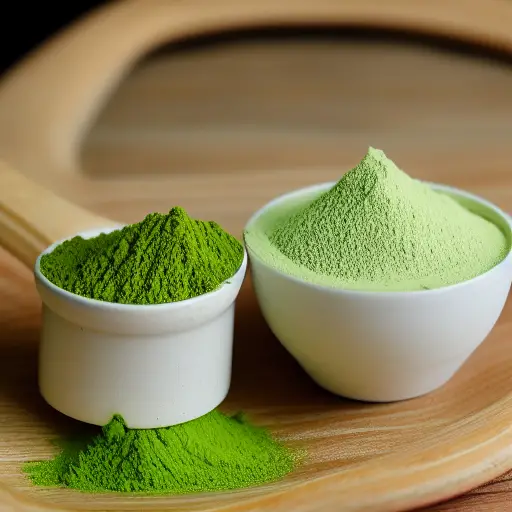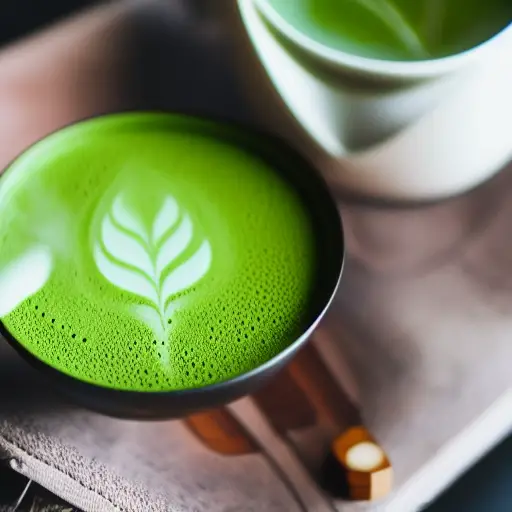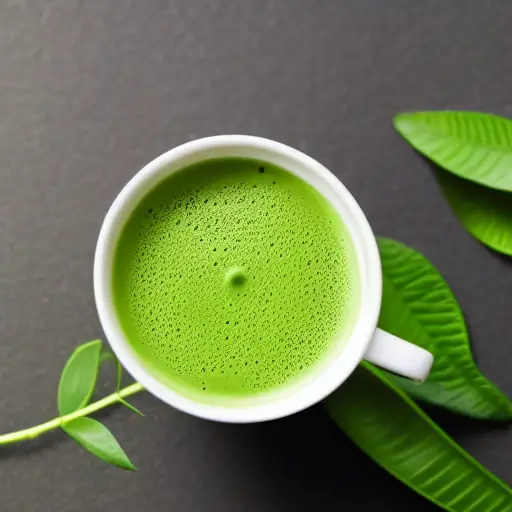As a barista, you’re probably familiar with matcha—it’s been one of the most popular drinks on coffee shop menus for the past few years. But do you know what makes it so special? Matcha is made from ground tea leaves, which are specially cultivated and dried to produce a bright green powder. Unlike steeped tea, in which the leaves are discarded after use, with matcha you drink the whole leaf, giving you a more concentrated dose of antioxidants and caffeine. But is matcha acidic? Is it better for you than coffee? Let’s take a closer look.
Does matcha green tea contain caffeine?

The caffeine in matcha green tea is not the only concern, as it contains other ingredients that may have negative effects on the body. High amounts of caffeine can cause increased heart rate, anxiety, and insomnia. Excessive intake may also cause stress to the liver and lead to headaches and withdrawal symptoms. If you are concerned about caffeine, try starting with small amounts of matcha and gradually building your tolerance over time.
Compared to other beverages, caffeine in matcha green tea is not as strong. While a cup of coffee contains around 40 milligrams of caffeine, matcha’s caffeine content is just three to ten milligrams per serving. Caffeine can stay in the body for several hours and interfere with sleep, so it is not a good idea to drink coffee or other caffeinated drinks late at night.
Caffeine content varies from person to person. Caffeine levels in matcha tea depend on the age and amount of matcha powder used. In general, matcha contains a lower amount of caffeine than other types of tea, but a small amount may be dangerous for some people. For people who are sensitive to caffeine, it is a good idea to begin with half a teaspoon and then increase the amount gradually.
In addition to caffeine, matcha tea is also high in L-theanine and EGCG. These antioxidants are known to improve memory and reaction time. It can also be used as a pre-workout supplement or as a smoothie. A recent study has even linked matcha to lowering bad LDL cholesterol levels.
Green tea contains a lot of caffeine, but it’s lower than coffee. One cup of matcha contains about 34 mg, while a cup of coffee has 95 milligrams. Matcha is usually consumed during a traditional Japanese tea ceremony, but it can also be eaten as a standalone beverage or mixed with other foods. It is also widely used in cooking, where it adds a color-popping flavor and extra health benefits.
Green tea is a natural source of caffeine, but how it is prepared affects its caffeine content. Typically, an 8-oz. cup of green tea contains 25 to 45 mg of caffeine. This is significantly less than coffee, which contains 80-110 mg per 8-oz. cup.
Does it contain L-theanine?

Among the many benefits of matcha, L-theanine is a key ingredient. This amino acid can improve brain function, promoting a calm, focused state. It has been found to decrease stress and anxiety, as well as decrease the effects of caffeine, which is an ingredient in coffee and other beverages. Matcha has a high concentration of this amino acid, making it a great option for people who are looking for a natural way to reduce their stress.
L-theanine triggers alpha-wave brain activity and increases dopamine production, which elevates mood and reduces stress. It can also help you improve your memory, focus, and cognitive abilities, which are all important for healthy functioning. Some research has also indicated that L-theanine can influence the levels of dopamine and cortisol in your body. As a nootropic, L-theanine can help you become more focused and relaxed, helping you achieve your goals.
There are two ways to get L-theanine: tea and supplements. While most teas have varying amounts of the amino acid, matcha has the highest concentrations of the compound. Its savory flavor and calm focus are both attributed to L-theanine. But not all tea contains equal amounts of the amino acid, and black teas tend to be higher in caffeine and less in L-theanine than green teas.
Matcha is a green superfood with less caffeine than coffee and energy drinks, but its effects last longer and are more consistent. While matcha is a great choice for those who want to reduce their caffeine intake, it is still important to note that matcha does contain caffeine, which can be harmful to your body. When taken in small doses, matcha can reduce the effects of caffeine and improve your cognitive performance.
Matcha is a Japanese powdered green tea that has a slight umami flavor. It contains about five times more L-theanine than regular green tea. This is due to the shading technique used by Japanese tea farmers. The process minimizes the effects of photosynthesis and preserves the amino acid in the leaves.
Does it contain EGCG?

Matcha tea contains more caffeine than green tea, but the exact amount depends on how old the tea is and how it is stored. It can contain 50-100 milligrams of caffeine per cup. Its added L-theanine compound modifies the effect of the caffeine, boosting levels of calming brain chemicals and dampening stress and anxiety chemicals. Drinking matcha is best done on an empty stomach, since the caffeine content cannot be absorbed by food.
Matcha also boosts the body’s antioxidant levels, which provide extra protection from oxidative damage. Additionally, it can help treat nonalcoholic fatty liver disease. However, people who consume high-EGCG green tea supplements should be wary of the effects on the liver. In some cases, they may cause liver damage.
The polyphenols in matcha tea are a standout antioxidant source. These natural compounds also help promote healthy circulation and support the health of the cardiovascular system. EGCG has a relaxing effect on the cardiovascular system, helping the blood vessels relax. Drinking matcha is an excellent way to boost your health, and the process of preparing the tea is easy and affordable.
The level of EGCG in matcha tea will vary depending on the quality and the amount of matcha used per cup. In general, a single cup of matcha tea will contain between 40 and 80 milligrams of EGCG. This level is much higher than that in regular green tea.
EGCG is a powerful antioxidant and has anti-inflammatory properties. It helps improve the blood flow, reduces blood pressure, and reduces cholesterol. It also boosts memory, cognitive performance, and reduces fatigue. Furthermore, it prevents the development of several diseases, including rheumatoid arthritis.
Does it contain Quercetin?

Did you know that quercetin is a potent antioxidant? This natural pigment is found in many plants, especially the leaves and skin. It has many beneficial properties, including reducing blood pressure and cholesterol. It also relaxes blood vessels. Men may also benefit from quercetin, as reduced blood flow can lead to erectile dysfunction. Also, quercetin has been shown to improve brain health. It reduces inflammation and may even protect the brain from harmful toxins.
Quercetin belongs to a family of plant compounds known as flavonoids. It is an effective antioxidant that scavenges free radicals, which cause damage to our cells and DNA. It also serves as a prebiotic, which means that it can help your body absorb nutrients from foods. Quercetin is a powerful antioxidant, but you need a significant amount to see benefits.
Quercetin may reduce glucose levels and may aid in weight management. It may also improve insulin sensitivity. Its antioxidant and neuroprotective properties may also help prevent the development of some neurodegenerative diseases. Matcha is known to contain high levels of this flavonoid.
In addition, quercetin has anticarcinogenic properties. It inhibits tumor growth in ER/PR-positive and ER-negative breast cancer cells. In addition, it has an estrogen receptor-independent effect. A study by Duo et al. found quercetin inhibits the mTOR signal cascade.
High-performance liquid chromatography (HPLC) has been used to measure the concentration of quercetin in tea. The researchers measured the tea extract in the presence of ethanol and dissolved H2O, and then calculated the concentrations of both substances. The results were then analyzed using ClarityChrom software.







